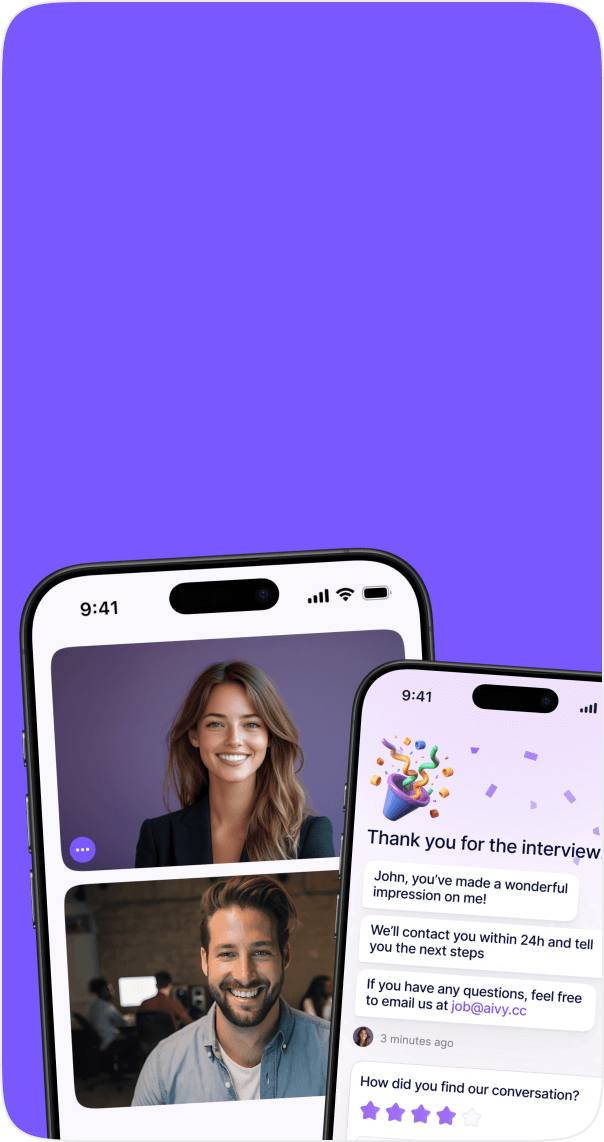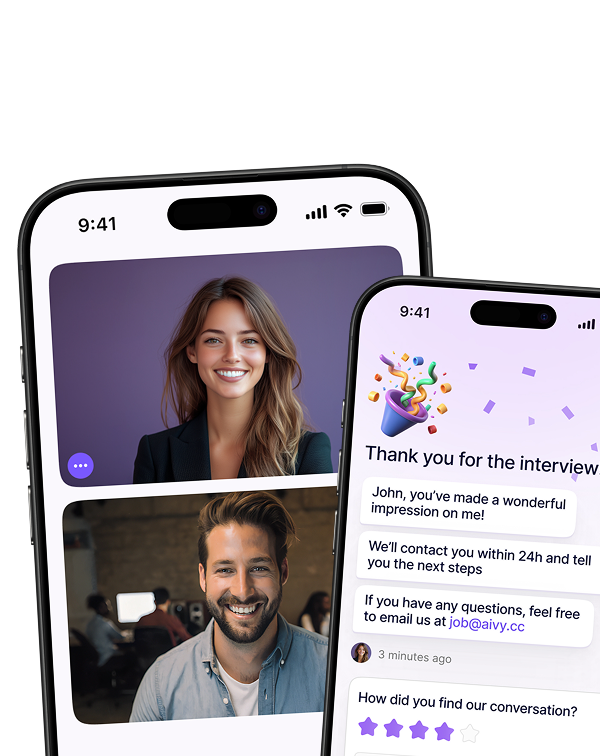Mar 3, 2025
Candidates would rather talk to AI than your HR team.
TL;DR: The data is clear but nobody wants to admit it: a significant percentage of job candidates are more comfortable opening up to an AI interviewer than your human recruiters. This isn’t futuristic speculation—it's happening now. Companies leveraging this psychological insight are capturing better talent while their competitors cling to outdated "human touch" recruiting myths. The uncomfortable truth most executives miss: blue-collar workers are now harder to find than white-collar workers. This isn’t just another HR challenge—it's an existential business threat that will determine which companies survive the next decade.
Let’s cut through the usual HR platitudes about "the irreplaceable human connection" in the hiring process. The research tells a more interesting story—one that most HR leaders are too uncomfortable to acknowledge.
The counterintuitive finding no one wants to talk about
Here's the reality that's been staring us in the face: 32% of Americans already feel comfortable with AI conducting their job interviews. This isn't some fringe preference—it's nearly a third of your talent pool. What's more striking is that when people actually experience AI interviews, satisfaction rates climb dramatically—with companies like Unilever seeing over 80% positive feedback from candidates who went through their AI-driven process.
The raw truth? For many candidates, your well-intentioned human recruiters are actually a liability, not an asset.
The raw truth? For many candidates, your well-intentioned human recruiters are actually a liability, not an asset.
Why candidates actually prefer the machine
The psychology behind this preference is fascinating and brutally logical:
1. Your human recruiters make them nervous
Studies consistently show that the presence of a human evaluator spikes anxiety. Your recruiters' frowns, note-taking, and subtle cues of skepticism are triggering fight-or-flight responses in candidates who then perform worse.
By contrast, AI interviews are perceived as less intimidating than traditional in-person meetings. When candidates know there's no person visibly judging them across the table, their performance improves. This isn't theory—it's documented in multiple studies.
2. They can be more honest with a machine
Here's where it gets interesting. In a clinical trial at USC, researchers discovered that people were significantly more forthcoming with a virtual interviewer when they believed no human was monitoring the interaction. Participants literally said things like:
"This is way better than talking to a person. I don't really feel comfortable talking about personal stuff to other people."
"A human being would be judgmental... I shared a lot of personal things [with the AI] because of that."
Translation: Candidates will tell your AI things they'd never tell your recruiters.
3. They trust AI's objectivity more than your "unbiased" recruiters
In a recent HireVue survey, 64% of workers said AI tools are as fair or more fair than human interviewers in treating applicants. Nearly half (49%) believe AI could help reduce bias in hiring.
This isn't just candidate perception—the data backs it up. When Unilever implemented AI interviews, they didn't just improve efficiency (cutting time-to-hire by 90%)—they achieved their most diverse recruiting class to date.
Your candidates aren't naive. They know human recruiters have unconscious biases. They know your recruiter might be having a bad day, might not like their accent, or might be rushing to make a lunch meeting. AI doesn't have these problems.
1. Your human recruiters make them nervous
Studies consistently show that the presence of a human evaluator spikes anxiety. Your recruiters' frowns, note-taking, and subtle cues of skepticism are triggering fight-or-flight responses in candidates who then perform worse.
By contrast, AI interviews are perceived as less intimidating than traditional in-person meetings. When candidates know there's no person visibly judging them across the table, their performance improves. This isn't theory—it's documented in multiple studies.
2. They can be more honest with a machine
Here's where it gets interesting. In a clinical trial at USC, researchers discovered that people were significantly more forthcoming with a virtual interviewer when they believed no human was monitoring the interaction. Participants literally said things like:
"This is way better than talking to a person. I don't really feel comfortable talking about personal stuff to other people."
"A human being would be judgmental... I shared a lot of personal things [with the AI] because of that."
Translation: Candidates will tell your AI things they'd never tell your recruiters.
3. They trust AI's objectivity more than your "unbiased" recruiters
In a recent HireVue survey, 64% of workers said AI tools are as fair or more fair than human interviewers in treating applicants. Nearly half (49%) believe AI could help reduce bias in hiring.
This isn't just candidate perception—the data backs it up. When Unilever implemented AI interviews, they didn't just improve efficiency (cutting time-to-hire by 90%)—they achieved their most diverse recruiting class to date.
Your candidates aren't naive. They know human recruiters have unconscious biases. They know your recruiter might be having a bad day, might not like their accent, or might be rushing to make a lunch meeting. AI doesn't have these problems.
The business case your CHRO needs to hear
This isn’t about cool technology—it's about competitive advantage in talent acquisition. Companies implementing AI-assisted interviewing are seeing:
What’s particularly striking is what happened when a manufacturing company shifted from 12-hour shifts to more flexible part-time shifts with AI-driven hiring: they immediately saw a surge in Gen Z applicants. The limiting factor wasn’t the candidates—it was the rigid recruitment approach.
- Better quality hires because candidates are more authentic and less performative
- Faster hiring cycles with 90% reductions in time-to-hire possible
- Improved diversity by removing unconscious bias barriers
- Higher completion rates in the application process
- Measurable improvement in candidate experience scores
What’s particularly striking is what happened when a manufacturing company shifted from 12-hour shifts to more flexible part-time shifts with AI-driven hiring: they immediately saw a surge in Gen Z applicants. The limiting factor wasn’t the candidates—it was the rigid recruitment approach.
What actually works: The hybrid model
To be clear, this isn’t about removing humans entirely. The research shows candidates still want human connection in final hiring stages. The optimal approach is using AI for what it does best:
Then bring humans in for relationship-building, deeper discussions, and final decision-making. This isn’t theoretical—it's what market leaders are already implementing.
- Initial screening and structured interviews where AI’s consistency shines
- Skills assessments where the focus should be purely on ability
- Preliminary culture fit exploration where candidates might be more honest about preferences
Then bring humans in for relationship-building, deeper discussions, and final decision-making. This isn’t theoretical—it's what market leaders are already implementing.
Your competitors are already moving
While most CHROs are debating whether AI has a place in recruiting, forward-thinking companies are quietly reengineering their entire talent acquisition funnel.
Unilever’s AI transformation didn’t just save 50,000 hours of recruiter time—it dramatically expanded their talent pool because candidates could complete interviews on their own schedule. When one retail giant implemented similar technology, they saw application completion rates rise by 35%.
Unilever’s AI transformation didn’t just save 50,000 hours of recruiter time—it dramatically expanded their talent pool because candidates could complete interviews on their own schedule. When one retail giant implemented similar technology, they saw application completion rates rise by 35%.
The bottom line
The uncomfortable truth is this: For a significant portion of your candidates, talking to a machine feels safer, fairer, and less stressful than talking to your recruitment team. This isn’t a futuristic hypothesis—it's happening right now.
Companies that recognize and leverage this insight aren’t just saving money on recruitment—they're accessing better talent because they’re getting more authentic responses from candidates who feel psychologically safe enough to be honest.
Your candidates have already decided they’re comfortable with AI interviews. The question is whether your organization will be honest enough with itself to adapt.
Companies that recognize and leverage this insight aren’t just saving money on recruitment—they're accessing better talent because they’re getting more authentic responses from candidates who feel psychologically safe enough to be honest.
Your candidates have already decided they’re comfortable with AI interviews. The question is whether your organization will be honest enough with itself to adapt.
Is your company experimenting with AI in the hiring process? What surprising candidate preferences have you discovered? Share your experiences in the comments.







